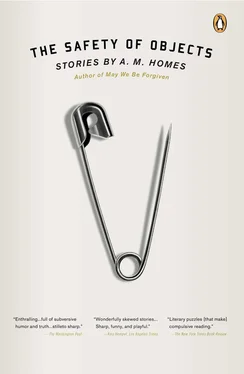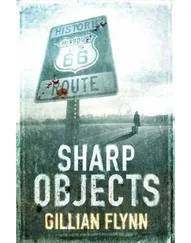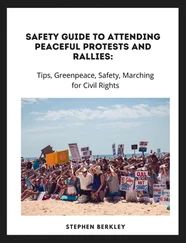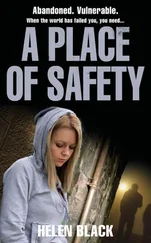“Congratulations,” Jim’s secretary says, still holding the potted plant, which must weigh at least forty pounds. “Where should we put it?”
“Take it home,” Jim says. “I have terrible allergies.”
His secretary carries the plant out to her desk, and Jim calls home again. The line is busy.
The shock of the award, the plant in particular, has left him weak. He’s still seeing the blue spots from the photographer’s flash in front of his eyes. There is no way he can work.
“Early lunch appointment, slipped my mind,” Jim says as he passes his secretary’s desk on his way out.
I am a self-made man, he tells himself in the elevator. He looks into the silver polish of the control panel and sees his reflection, distorted. I made you and I can break you, anytime I want. Something to keep in mind, buddy boy.
Jim takes a long walk, circling the block twice, picking up the power to go farther, then heading in the direction of the river. He thinks about his job, about the view from Patterson’s big chair, about how good it feels to finally let go when you’ve been holding it in all afternoon. Within a half hour, Jim is so fully revived that he marches back to the office.
There are police cars and fire engines everywhere. The street has been sealed off and is filled with people. Jim is panicked and dizzy. No one seems to know what the situation is. He finally spots his secretary, standing tall above the crowd.
“I’m so glad you’re all right,” she says.
“What’s going on?” Jim asks.
“Bomb threat,” his secretary says.
Jim sees Mr. Patterson leaning on a police car and goes to him.
“Train, Train, I’m so glad they found you,” Patterson says. “That’s it then, we’re all out.”
“Is there really a bomb?”
Patterson looks grim. “Could be,” he says. “Don’t really know. We’ve got a couple of difficult cases coming up, could be related. Remember Wertheimer?” Patterson says, referring to someone who was let go under strange circumstances a few months earlier. “Could be Wertheimer. You never know what a man will do.” Patterson nods, tapping his fingers to his head, indicating the possibility of insanity. Train nods vigorously along with Patterson. “Go home,” Patterson says. “Call it a day.”
Jim shakes his head. “My briefcase is inside. I’ve got calls to make.”
“Go on,” Patterson says, flicking his fingers as if shooing Jim away. “Go home.”
Jim lingers. He doesn’t want to go home. He wants to go to work. He is the Man of the Year. His plaque is up there on the thirty-fourth floor, just next to his desk. He has to decide where to hang it. Jim walks down Lexington Avenue to Forty-second Street, feeling rejected, disconcerted by the absence of his jacket and briefcase.
He thinks of a bomb and imagines it buried in Patterson’s plant, launching the tall tropical wonder like a missile. The plant crashes through a single window on the thirty-fourth floor as though heaved in anger. A second later all the windows blow out, and a ball of orange fire claims the floor. Whoosh , the world is up in smoke.
* * *
Jim takes the two-forty train home and walks up the sidewalks, warm and clear with afternoon sun. The streets are full of station wagons, carpools going in all directions. He has the clear impression from the looks drivers give him that the sidewalks are not intended for use by anyone except women with strollers and children under twelve.
He passes the spastic boy that he sees every evening, except in foul weather. The boy is never out in the mornings, and Jim imagines that because of his twisted shape it takes a very long time to get him dressed and fed. He stands in matching pants and shirt at the foot of his parents’ driveway, frozen in a bent, painful pose, giving Jim a clear idea of what a cast-iron jockey would look like if it were struck by a car or truck.
The boy sees Jim and waves. Jim waves back. He never speaks because he’s afraid the boy will talk to him and perhaps he won’t understand what the boy is saying and then it will get complicated and even more depressing, so he leaves it at the waving.
On this occasion Jim worries that perhaps he has confused the boy by coming home early and maybe the boy will do something like go inside expecting dinner to be served. Perhaps his mother will think his action is proof of her suspicion that he’s regressing and that he really is getting too old and difficult for her to care for and before supper she will call the institution and arrange for them to come and collect him by morning.
Jim has the urge to go back down the block and explain his arrival, but the idea of explaining is too exhausting and he resigns himself to feeling guilty.
Jim’s key doesn’t open the door. Instantly, he’s afraid that he has walked to the wrong house, he has forgotten his own address, he will become like the spastic boy and stand frozen at the end of the driveway until someone, his wife he hopes, drives by and recognizes him.
He goes from the kitchen door to the front door and back again. He jumps up and looks in the window and feels comforted when he sees his loafers lying empty in the hall. The familiarity of his belongings and the sensation of being separated from them make him that much more determined to get inside. He breaks the key in half trying to work the lock open.
“Shit,” he says.
“Hello?”
He hears his neighbor’s voice through the bushes at the end of the driveway.
“Is someone there?”
He doesn’t answer. He sits on the steps as though he’s been sent out as punishment. He is alone in what he thinks of as the middle of nowhere. For five minutes he just sits there, his knees up to his chest, poking the plastic ends of his shoelaces into the eyelets on his shoes, resting.
This would never have happened on Eighty-seventh Street. He would have gone downstairs and gotten the extra key from the super. He would have run around the corner to the Pearlmans’ and waited there in the comfort of their living room. Jim is living in the past, a place where his memory tells him life was easier, almost effortless.
Jim removes his tie and goes into the backyard in his pink oxford-cloth shirt and gray flannel pants. He relieves himself in an azalea bush, but it is boring, like being on a camping trip. Little green shoots are poking up all over the yard. His children have left a trowel and a hand rake in the dirt by the driveway, and it occurs to Jim that weeding will make him feel better; it will divert his anxious energy. It will make him a farmer, a man he has never been before.
He gets down on his hands and knees and begins digging, pulling green things out of the dirt. He makes three stacks of weed balls and is in the process of making a turban out of his shirt when a car pulls into the driveway. He runs around the side of the house, joyous that his family has returned, his shirt wrapped loosely around his head, the sleeves hanging down like floppy ears.
Bill’s Repair Man looks at him as though there’s some sort of a problem. His expression causes Jim to look down at himself. He’s covered with dirt. Clumps of soil are embedded in his chest hair. His gray flannels have grass stains unlike any seen in detergent commercials. One pant leg is ripped open at the knee, the skin under it raw, from when Jim accidently kneeled down hard on a buried rock.
“Doing a little planting?” the repair man asks.
The name sewn on his uniform says Bob even though the truck says Bill. Jim figures that Bob must work for Bill, perhaps they’re even related.
“Weeding actually,” Jim says, relishing the sensation of explaining himself to a guy with his name sewn on his shirt who clearly doesn’t know putting in from taking out, planting from weeding.
Читать дальше












